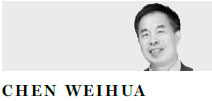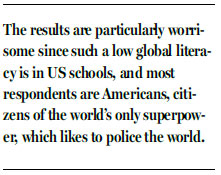Abysmal global literacy of US college students
Updated: 2016-10-21 08:05
By Chen Weihua(China Daily)
|
|||||||||
The poor global literacy of college-aged students in the United States revealed in a recent survey provides a clue to why US politicians can publicly and falsely accuse China time and again.
The global literacy survey, sponsored by the Council on Foreign Relations and the National Geographic Society, found that only one-quarter of the students knew that China is a country with veto power over United Nations Security Council resolutions due to its status as a permanent member of the council.
Less than half (49 percent) knew that Mandarin Chinese was spoken by the most people in the world as their primary language. And 67 percent believe China has a larger economy than the US, some-thing only true according to an IMF report comparing purchasing power. Only 29 percent think the US economy is larger.
No wonder the two US presidential candidates, Republican Donald Trump and Democr at Hillary Clinton, can accuse China of currency manipulation despite the basic facts.

Fred Bergsten, a senior fellow at the Peterson Institute for International Economics, who years ago accused China of currency manipulation, is now saying that there is no currency manipulation in China and if there is, it's only positive manipulation. A US Treasury report on Oct 14 dismissed China as a currency manipulator. It instead praised China's intervention in foreign exchange markets as seeking to prevent a rapid RMB depreciation that would have had negative consequences for the global economy.
Council on Foreign Relations President Richard Haass and National Geographic Society President and CEO Gary Knell collectively sighed at the significant gaps between what young people understand about today's world and what they need to know to successfully navigate and compete in it.
Only 29 percent of the respondents earned a minimal pass (66 percent correct or better). Just over 1 percent - 17 of 1,203 - earned an A (91 percent or higher).
Other shocking findings included only 28 percent knew the US is bound by treaty to protect Japan if it is attacked and only 34 percent knew this about South Korea. More alarmingly, only 30 percent knew that the US Congress is the constitutional authority to declare war.

The results are particularly worrisome since such a low global literacy is in US schools, and most respondents are Americans, citizens of the world's only super-power, which likes to police the world.
It would be interesting to see the results if a similar test was conducted among the 535 voting members of the US Congress, who like to point fingers at the rest of the world in frequent hearings about global, regional and China-related issues.
One reason for such low global literacy could be the fact that TV networks in the US include very little international news despite the fact that many global hot spot issues are directly linked to US foreign policy.
The National Committee on US-China Relations held its annual China Town Hall event on Tuesday evening, featuring keynote speaker Henry Kissinger. The event included local programs in 85 venues across the US to educate people about key issues in US-China relations.
As I observed in the Confucius Institute US Center in Washington, such events would help improve people's global literacy about China.
While the more than 310,000 Chinese students enrolling in US universities are a source of education about China, only 5 percent of a total of 304,467US students studying abroad during the 2013/14 academic year went to China, trailing the United Kingdom, Italy, Spain and France.
There is no doubt that US has much to do to educate its young generation about the world.
The author is deputy editor of China Daily USA. chenweihua@chinadailyusa.com
(China Daily 10/21/2016 page9)
Today's Top News
EU leaders mull new trade rules
English cities hope to woo Chinese investment
UK's May tries to reassure EU on Brexit
Lawmakers stage walkout to protest anti-China acts
Syrian army declares 3-day truce in Aleppo
BBC report on Terracotta Warriors refuted
Iraqi forces recapture more villages around Mosul
Greeks rally against labor reforms
Hot Topics
Lunar probe , China growth forecasts, Emission rules get tougher, China seen through 'colored lens', International board,
Editor's Picks

|

|

|

|

|

|







